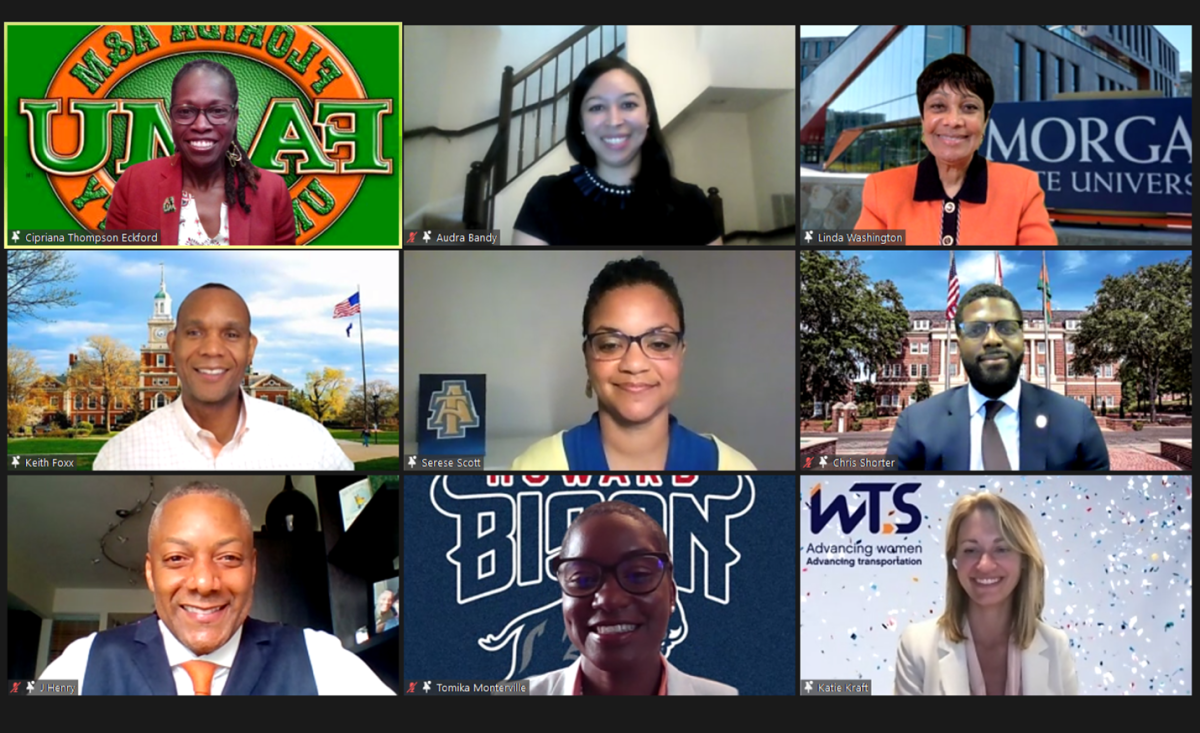Making the Connection: The Transportation Industry and HBCUs
By Cipriana Thompson Eckford, WTS-DC
The WTS-DC Diversity Committee participated in a three-part series, in conjunction with the DC chapter of the Conference of Minority Transportation Officials (COMTO) and the Institute of Transportation Engineers (ITE), entitled “Making the Connection: The Transportation Industry and Historically Black Colleges and Universities (HBCUs).” WTS-DC led the second panel, “Fruits of the Vine – The Role and Importance of HBCU Alumni,” on May 19.
HBCUs were established in the United States in the early 19th century to provide undergraduate, and eventually, graduate-level educational opportunities to people of African descent. Black students were unwelcome at existing public and private higher education institutions, even after passing specific legislation, resulting in a lack of higher education opportunities. Because of that, in the 1800s and early 1900s, HBCUs were primarily the only viable choice for Black students when it came to higher education. Now, while the educational selections are much broader, HBCUs still stand strong as primary educators of Black students and producers of Black graduates, particularly in the STEM fields.
As our society and the transportation industry struggle and strive to evolve into more equitable and diverse spaces, we want to seek ways to advance the conversation and action needed to make that happen. How do we better connect these institutions educating and graduating these talented STEM students of color with the industry that desperately needs their skills, contributions, and diverse perspectives? In part, we do that by developing and strengthening the relationships between the two. We connect and encourage the industry not just to seek talent from HBCUs but to genuinely develop meaningful relationships with HBCUs and other minority-serving institutions that are long-standing and mutually beneficial. We talk about mentorship, internship, scholarship, and sponsorship. We talk about how to create a space that is educational, fruitful, and welcoming.
This panel discussion allowed for an impactful conversation with the panelists who are all graduates of HBCUs and are engaged with the transportation industry. The panelists included Serese Aranha-Scott, PE, PTOE (HDR – Senior Program Manager for MD/DC, North Carolina A&T State University); Keith Foxx, PE, PMP, CCM (FOXXSTEM – Principal, Howard University); John Henry, CPA, CTP, MBA (American Public Transportation Association – Chief Financial Officer, Virginia State University and Howard University); Tomika Monterville, MSP (City of San Antonio DOT – Director, Howard University); Chris Shorter (City of Baltimore – City Administrator, Florida A&M University); and Linda Washington (The Washington Consulting Team – President and CEO, Morgan State University). WTS-DC Diversity Committee members, Audra Bandy, PE, PTOE (Fairfax County DOT – Senior Transportation Planner/Team Lead, Washington University in St. Louis) and Cipriana Thompson Eckford, PE, PTOE (Toole Design Group – Mid-Atlantic Regional Operations Director, Florida A&M University) moderated the discussion.

The panelists fondly shared their experiences at their respective HBCUs and emphasized the difference that their HBCUs made in their lives. They spoke passionately about the impacts that HBCUs have on their students, how well they prepare them to be strong contributors to society, and the critical role they occupy and can continue to play in bolstering the talent and diversity in the STEM fields. Similar to the groups of panelists (from academia and the industry) in the other panels in the series, these proud alumni stressed the importance of the industry developing meaningful relationships with HBCUs that extend beyond just hiring graduates. There is much work to be done, and conversations like these are a great start!
View the panel discussions:
- Telling the Story: HBCU Engineering Programs (http://bit.ly/HBCUPanelAcademia)
- Fruits of the Vine: The Role and Importance of HBCU Alumni (http://bit.ly/HBCUPanelAlumni – Passcode: Gz9Qn0U@)
- Partnerships and Opportunities: Advancing the Relationships between the Transportation Industry and HBCUs (http://bit.ly/HBCUPanelIndustry – Passcode: COMTO3HBCU!)